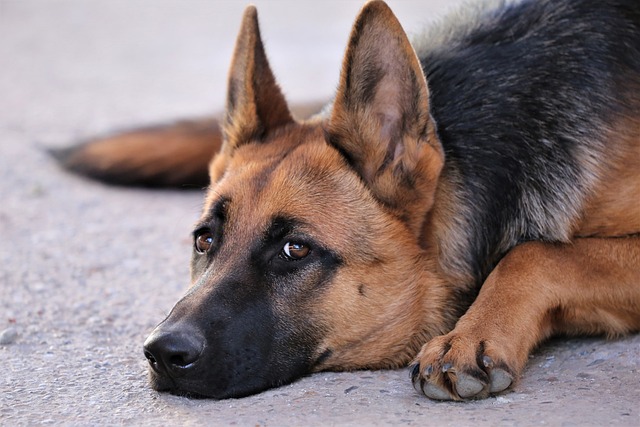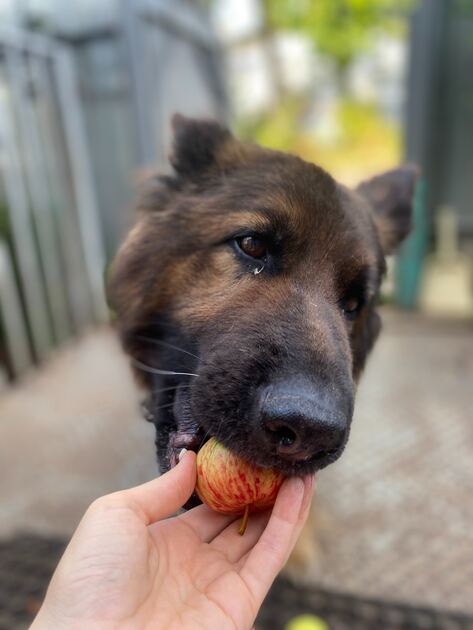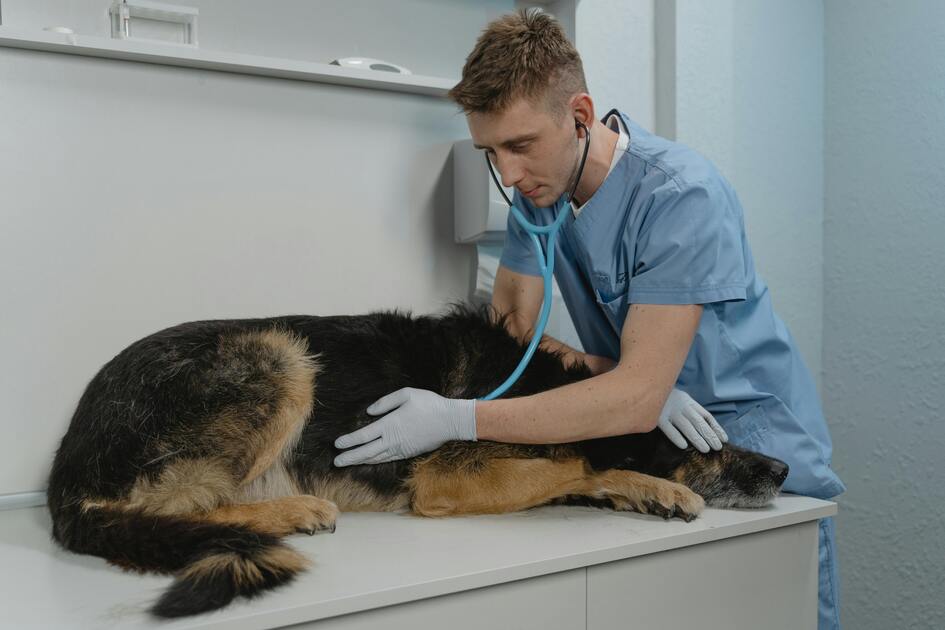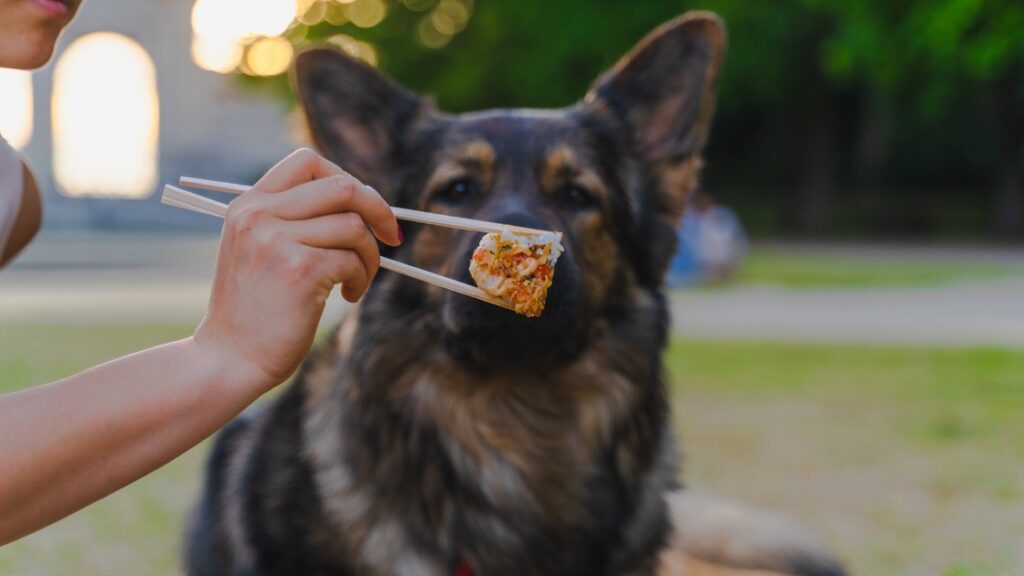If you’ve noticed your beloved German Shepherd turning their nose up at meals, it’s time to play detective. Several factors could contribute to this sudden change in appetite.
First and foremost, consider visiting the vet to rule out any underlying health issues, from dental problems to gastrointestinal troubles. German Shepherd is not eating is Behavioral factors such as stress or environmental changes can also play a significant role in your dog’s eating habits.
Palatability matters too – just like humans, dogs have taste preferences. Experiment with different flavors and textures to find the perfect fit for your furry friend.
Creating a calm and positive mealtime environment, along with exploring appetite-stimulating solutions, can be key in reigniting your German Shepherd is not eating.
Dive into this comprehensive guide to uncover the reasons behind your German Shepherd’s reluctance to eat and pave the way for a happier, healthier pup.
Reasons Why your German Shepherd is not eating
Discovering the reasons behind your German Shepherd’s reluctance to eat can be perplexing, but fear not – we’re here to shed light on the matter. First and foremost, consider the possibility of underlying health issues.
Dental problems, gastrointestinal concerns, or infections could be affecting your dog’s appetite, warranting a visit to the vet for a thorough examination. On the behavioral front, stress and changes in the environment can play a significant role in your German Shepherd is not eating habits.
Dive deeper into the culinary preferences of your furry friend – just like us, dogs have taste preferences, and finding the right balance can reignite their interest in meals.
Create a serene mealtime atmosphere, explore appetite-stimulating solutions under vet guidance, and unlock the mystery behind why your German Shepherd may be abstaining from their food.
This comprehensive guide will navigate you through potential causes and effective solutions, ensuring a happier and healthier dining experience for your beloved pup. Following are the reasons why German Shepherd is not eating:
- Do not like food
- Pain
- Medication
- Parasite Condition
- Stress
- Depression
- Serious illness
- Cancer
- Separation Anxiety
1: What to Do When Your German Shepherd Doesn’t Like Food
It can be disheartening when your German Shepherd develops a disinterest in their meals. Understanding and addressing this issue requires a strategic approach. First and foremost, consider a visit to the vet to rule out any underlying health concerns.
Once health issues are ruled out, delve into the culinary preferences of your furry friend. Dogs, much like us, have taste preferences, and finding the right balance of flavors and textures can rekindle their interest in food.
Assess the mealtime environment – creating a calm and positive setting can make a substantial difference. If your German Shepherd is not eating and is still hesitant, experiment with appetite-stimulating solutions under the guidance of your vet.
This comprehensive guide offers insights and practical tips to navigate the challenge of a picky eater, ensuring a happier and healthier dining experience for your cherished companion.
2: Understanding Why Your German Shepherd Is not Eating Due to Pain
It’s a distressing scenario when your usually voracious German Shepherd is not eating, and pain could be a significant culprit. If your furry companion is experiencing discomfort, especially dental issues or underlying health concerns, it can directly impact their appetite.
A visit to the vet for a comprehensive examination is paramount to identify and address potential pain sources. Dental problems, joint issues, or internal discomfort might be hindering their ability to enjoy meals.
Once the root cause is determined and managed, implementing a gentle approach to their diet, such as softer or tailored foods, can aid in the recovery process.
Creating a serene and comfortable mealtime environment is equally essential to encourage your German Shepherd is not eating to despite their discomfort.
This guide provides insights into recognizing and addressing pain-related eating issues, ensuring a compassionate approach to your pet’s well-being.

3: German Shepherds Refusing Food Due to Medication
It can be perplexing when your German Shepherd’s appetite takes a hit, and medication may be the surprising culprit. Certain medications, while crucial for their health, can sometimes lead to a loss of interest in food.
If you’ve recently introduced a new medication to your pet’s routine and noticed a change in eating habits, it’s essential to consult your vet. They can help determine if the medication is causing the aversion and explore alternative options or adjustments to alleviate this issue.
Additionally, considering the timing of medication meals can play a role. Creating a positive association with mealtime, perhaps by offering treats alongside medication, may encourage your German Shepherd is not eating to overcome their reluctance.
This comprehensive guide provides insights into addressing medication-related eating challenges, ensuring your pet’s health journey remains a positive and nourishing experience.
4: German Shepherd is not eating Food Due to Gastrointestinal Parasite Condition
When your loyal German Shepherd suddenly turns away from their food, a potential underlying cause could be a gastrointestinal parasite condition. These unwelcome invaders can wreak havoc on your pet’s digestive system, leading to a loss of appetite.
If you notice symptoms such as vomiting, diarrhea, or lethargy alongside their reluctance to eat, it’s crucial to consult your vet promptly. Gastrointestinal parasites, such as worms, can cause discomfort and disrupt the normal functioning of the digestive tract.
Your vet may recommend appropriate deworming treatments to eliminate these parasites and restore your German Shepherd’s digestive health.
In addition to medical intervention, ensuring a clean living environment and practicing preventive measures can go a long way in safeguarding your pet from recurring gastrointestinal issues.
This comprehensive guide sheds light on recognizing and addressing the impact of gastrointestinal parasites on your German Shepherd’s eating habits, promoting their overall well-being.
5: When Stress Affects Your German Shepherd’s Appetite
If your usually hearty-eater German Shepherd is turning their nose away from meals, stress could be the silent culprit. Dogs, much like humans, can experience stress, and its manifestation can include a loss of appetite.
Changes in the environment, routine disruptions, or even the introduction of a new family member can trigger stress in your furry companion. Understanding the source of stress is crucial to addressing the issue effectively.
Creating a calm and reassuring environment, maintaining a consistent routine, and offering comforting activities can help alleviate stress and encourage your German Shepherd to eat.
Bonding time, interactive play, and positive reinforcement during mealtime can also contribute to reducing stress-related eating challenges. This guide provides insights into recognizing and managing stress-related appetite issues, ensuring your loyal companion’s overall well-being.
6: Addressing Depression-Related Eating Challenges in Your German Shepherd
A sudden decline in your German Shepherd’s appetite may indicate deeper emotional struggles, and depression could be at the core of their reluctance to eat.
Dogs, being highly sensitive creatures, can experience feelings of sadness and disinterest, impacting their daily routines, including mealtime.
Identifying the source of depression, whether it’s due to changes in the household, loss of a companion, or other environmental factors, is crucial in finding a solution. Providing ample love, attention, and engaging activities can play a significant role in uplifting your pet’s spirits.
If the symptoms persist, consulting with a vet is recommended to explore additional measures or potential medical interventions.
This comprehensive guide aims to offer insights into recognizing and addressing depression-related appetite issues in your German Shepherd, promoting their emotional well-being and overall health.
7: Understanding Why Your German Shepherd Isn’t Eating Due to Serious Illness
When your loyal German Shepherd exhibits a sudden loss of appetite, a serious underlying illness may be the cause. It’s crucial to recognize the potential signs of distress, such as lethargy, changes in behavior, or other unusual symptoms.
If you observe such worrisome signs alongside their refusal to eat, immediate consultation with a vet is paramount. Serious illnesses, ranging from organ failure to systemic diseases, can directly impact your pet’s desire to eat.
Diagnostic tests and a thorough examination can help identify and address the specific health issue. Tailoring their diet to accommodate their condition, following prescribed treatments, and providing a calm and supportive environment are essential steps in aiding their recovery.
This comprehensive guide aims to shed light on recognizing and addressing serious illness-related appetite challenges in your German Shepherd, prioritizing their health and well-being.
8: Understanding Cancer-Related Eating Challenges in Your German Shepherd
Discovering that your German Shepherd is refusing food due to cancer can be heart-wrenching. Cancer can profoundly impact your pet’s overall well-being, leading to a loss of appetite as one of the distressing symptoms.
When faced with this situation, immediate consultation with a vet is crucial for a comprehensive diagnosis and tailored treatment plan.
Cancer-related treatments, such as chemotherapy, can further affect your dog’s appetite, emphasizing the need for a carefully managed and nutrient-rich diet.
Creating a peaceful and supportive environment, offering soft and palatable foods, and closely monitoring their overall health become paramount in navigating this challenging journey.
This guide aims to provide insights into recognizing and addressing cancer-related appetite challenges in your German Shepherd, ensuring compassionate care, and prioritizing their comfort during this difficult time.
9: Tackling Separation Anxiety-Induced Appetite Issues in Your German Shepherd
If your German Shepherd exhibits a reluctance to eat when you’re away, separation anxiety could be at the root of their mealtime woes. Dogs, being social creatures, can experience stress and anxiety when separated from their human companions.
This emotional distress may manifest as a loss of appetite, impacting their overall well-being. Recognizing the signs of separation anxiety, such as excessive barking, destructive behavior, or house soiling, is crucial for effective intervention.
Establishing a consistent routine, providing engaging toys, and creating a comfortable space for your dog when you’re not around can help alleviate their anxiety.
Gradual desensitization to your departure cues and incorporating positive reinforcement during mealtime can contribute to restoring their appetite.
This comprehensive guide offers insights into recognizing and addressing separation anxiety-related appetite challenges in your German Shepherd is not eating, fostering a harmonious relationship, and ensuring their emotional health.

How my German shepherd is eating again
Witnessing your German Shepherd is not eating enjoy their meals is a joy for every pet owner, but what if they’ve hit a rough patch and lost interest in eating? Fret not, as we unveil effective strategies to reignite your pup’s appetite.
First and foremost, a vet check is crucial to rule out any underlying health issues that might be affecting their eating habits. Once health concerns are addressed, consider exploring different flavors and textures in their meals to cater to their taste preferences.
Creating a positive and stress-free mealtime environment can work wonders, as dogs, like humans, appreciate a calm setting.
Additionally, incorporating appetite-stimulating solutions under the guidance of your vet can provide the extra nudge needed to ensure your German Shepherd is not eating excited about food again.
Dive into this comprehensive guide for practical tips and insights on bringing back the joy of eating for your beloved furry friend.
Influencing Your German Shepherd’s Feeding Behavior
Understanding and influencing your German Shepherd is not eating feeding behavior can be a dynamic process, often requiring adaptability and patience.
Changes in their eating habits may stem from various factors, such as alterations in diet, routine, or even the introduction of a new environment. If you’re seeking to modify their feeding behavior, consider a gradual transition when altering their diet to avoid digestive upset.
Consistency in mealtime routines, such as feeding at the same times each day, creates a sense of predictability that many dogs find comforting. Incorporating positive reinforcement, such as praise or treats during meals, can create a positive association with eating.
Moreover, observing and accommodating your dog’s preferences regarding food texture and temperature can play a pivotal role.
This comprehensive guide provides insights into recognizing and positively influencing changes in your German Shepherd is not eating feeding behavior, promoting a healthy and enjoyable mealtime experience for your beloved companion.
Influencing Your German Shepherd’s Feeding Behavior
Switching your German Shepherd is not eating food requires a thoughtful approach to ensure a seamless transition without disrupting their digestive well-being. Whether motivated by dietary changes, health considerations, or a desire to meet their evolving nutritional needs, a gradual shift is key.
Begin by mixing small amounts of the new food with their current one, gradually increasing the proportion over several days. This helps acclimate their stomach to the change, minimizing the risk of gastrointestinal upset.
Keep a watchful eye on their response, noting any signs of allergies or adverse reactions. Patience is essential as your loyal companion adjusts to the new flavor and texture.
If your German Shepherd shows hesitation, introducing the switch during a positive and calm mealtime environment can encourage acceptance.
This guide provides insights into successfully transitioning your German Shepherd is not eating, ensuring a smooth and enjoyable culinary shift for your cherished furry friend.
Taking Your German Shepherd to the Vet
Ensuring the well-being of your German Shepherd involves regular veterinary check-ups to address potential health concerns proactively. Scheduling routine visits allows your vet to monitor your dog’s overall health, catch any early signs of illness, and provide preventative care.
If you notice changes in their behavior, German Shepherd is not eating habits, or physical condition, a prompt vet visit becomes paramount. Annual vaccinations, dental check-ups, and discussions about nutrition are essential components of maintaining your dog’s health.
Regular vet visits also allow for personalized advice tailored to your German Shepherd’s specific needs. Establishing a trusting relationship with your vet fosters a sense of security for your pet, making each visit a positive experience.
This comprehensive guide emphasizes the importance of taking your German Shepherd is not eating to the vet, ensuring their health and happiness for years to come.

Conclusion
Understanding why your German Shepherd is not eating is akin to solving a puzzle, with each piece representing a potential factor influencing their appetite.
From health concerns and behavioral factors to dietary preferences and stressors, the reasons can be multifaceted. Navigating this challenge requires a holistic approach, combining veterinary insight, dietary adjustments, and a nurturing environment.
By recognizing and addressing the root cause, whether it’s a health issue, stress, or a simple change in preferences, you pave the way for a happier and healthier furry companion.
The journey to restore your German Shepherd is not eating appetite involves patience, observation, and the willingness to adapt. With the right blend of care and attention, you can unravel the mystery, ensuring your loyal companion returns to enjoying their meals with the zest they deserve.
FAQ
Q: How long is it normal for a dog to go without eating?
A: While it varies, a healthy dog can typically go a day or two without eating. If it extends beyond that, a vet visit is recommended.
Q: Can stress affect a dog’s appetite?
A: Absolutely. Dogs can experience stress, and it may manifest as a loss of appetite. Creating a calm environment can make a significant difference.
Q: Is it okay to change my dog’s food frequently?
A: Yes, rotating your dog’s meals can prevent boredom and ensure they get a variety of nutrients. Gradual transitions are key to avoiding digestive upset.
Q: What are the common signs of dietary allergies in dogs?
A: Watch for symptoms like itching, ear infections, gastrointestinal upset, or skin issues. Consult your vet if you suspect allergies.
Q: Can I use human food to diet my dog to eat?
A: While some human foods are safe for dogs, it’s crucial to choose carefully. Consult your vet for advice on incorporating human food into your dog’s diet.


